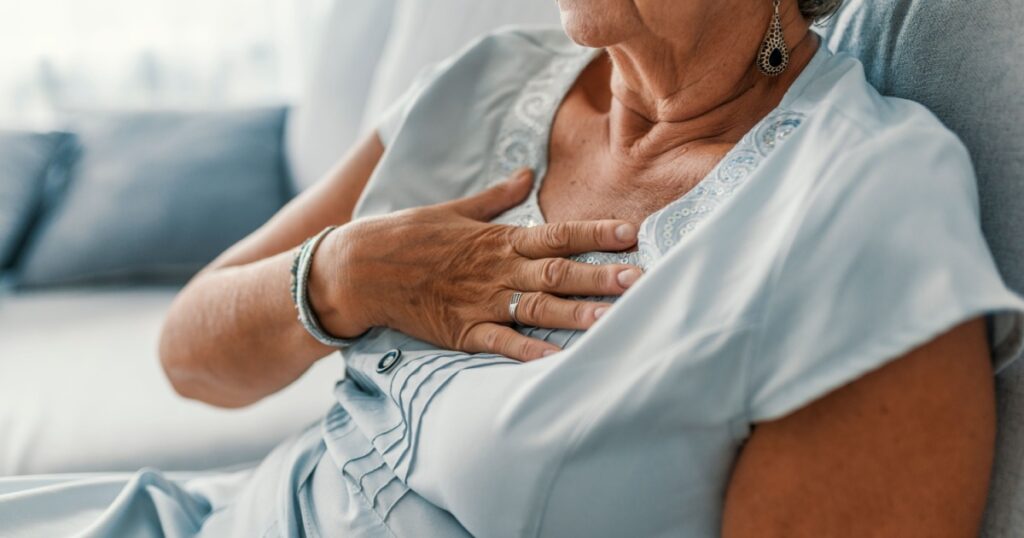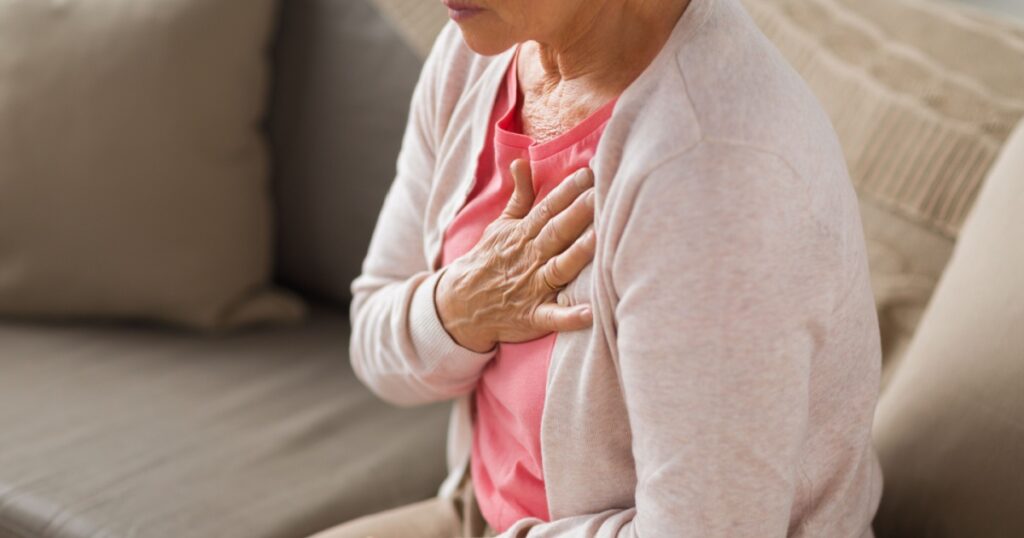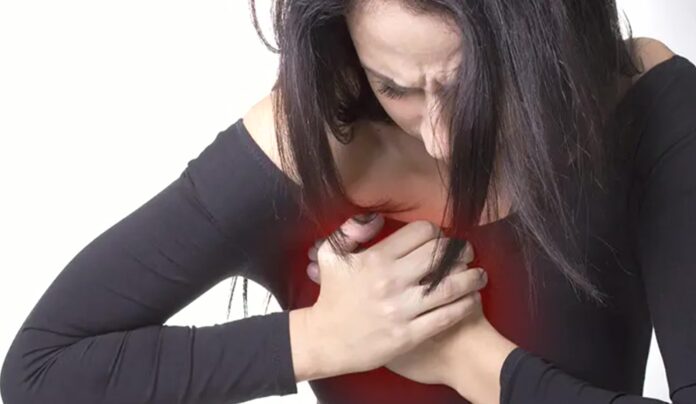In recent decades, scientists have realized that heart attack symptoms can be quite different for women than for men. The journal Circulation published the findings of a multicenter study of 515 women who’d experienced a heart attack. The most frequently reported symptoms didn’t include chest pain. Instead, women reported unusual fatigue, sleep disturbances, and anxiety. Nearly 80 percent reported experiencing at least one symptom for more than a month before their heart attack. In a survey published in the journal Circulation, only 65 percent of women said they’d call 911 if they thought they might be having a heart attack.
Symptoms of a heart attack in women include:

Even if you’re not sure, get emergency care right away. Base your decision on what feels normal and abnormal for you. If you haven’t experienced symptoms like this before, don’t hesitate to get help. If you don’t agree with your doctor’s conclusion, get a second opinion.
Read More: Are Eggs Bad For Your Heart?
Unusual fatigue lasting for several days or sudden severe fatigue

Profound and unexplained fatigue or a sudden decrease in energy levels can sometimes be a warning sign of a heart attack in women.
Sleep disturbances

Sleep disturbances, such as insomnia, unusual restlessness, or waking up frequently during the night, have been reported as warning signs in some women prior to a heart attack.
Anxiety

Some women may experience a sense of impending doom, anxiety, or a feeling that something is terribly wrong during a heart attack.
Read More: Man who survived heart attack captured the exact moment it took over his body
Lightheadedness

Feeling dizzy or faint is another symptom that may occur during a heart attack.
Shortness of breath

Feeling breathless or having difficulty catching your breath can be a symptom of a heart attack. This may occur with or without chest discomfort.
Indigestion or gas-like pain

Some women may feel nauseated or may vomit during a heart attack, which can be mistaken for other gastrointestinal issues.
Cold Sweats

Cold and clammy skin, along with sweating, can accompany a heart attack, especially in women.
Jaw pain or pain that spreads up to your jaw

Women may experience pain or discomfort in areas other than the chest, such as the neck, jaw, shoulder, back, or stomach. This pain may radiate from the chest and is often a more subtle symptom.
Pressure or pain in the center of your chest, which may spread to your arm

While chest pain is a common symptom in both men and women, women may experience different types of chest discomfort. It can be described as a squeezing, fullness, pressure, or burning sensation in the chest that may come and go.
Heart attack in women over 50

Women experience significant physical changes around age 50, the age when many women start to go through menopause. During this period of life, your levels of the hormone estrogen drop. Estrogen is believed to help protect the health of your heart. After menopause, your risk of heart attack increases. Unfortunately, women who experience a heart attack are less likely to survive than men. Therefore, it becomes even more important to remain conscious of your heart health after you go through menopause.
Remain aware of these symptoms and schedule regular health checkups with your doctor. There are additional symptoms of a heart attack that women over the age of 50 may experience. These symptoms include:
- severe chest pain
- pain or discomfort in one or both arms, the back, neck, jaw, or stomach
- rapid or irregular heartbeat
- sweating
Silent heart attack symptoms

A silent heart attack is like any other heart attack, except it occurs without the usual symptoms. In other words, you may not even realize you’ve experienced a heart attack.
In fact, research from Duke University Medical Center has estimated that as many as 200,000 Americans experience heart attacks each year without even knowing it. Unfortunately, these events cause heart damage and increase the risk of future attacks. Silent heart attacks are more common among people with diabetes and in those who’ve had previous heart attacks.
Symptoms that may indicate a silent heart attack include:

- mild discomfort in your chest, arms, or jaw that goes away after resting
- shortness of breath and tiring easily
- sleep disturbances and increased fatigue
- abdominal pain or heartburn
- skin clamminess
After having a silent heart attack, you may experience more fatigue than before or find that exercise becomes more difficult. Get regular physical exams to stay on top of your heart health. If you have cardiac risk factors, talk to your doctor about getting tests done to check the condition of your heart.
Schedule regular checkups

By scheduling regular checkups and learning to recognize the symptoms of a heart attack, you can help lower your risk of severe heart damage from a heart attack. This may increase your life expectancy and well-being.
Sources
- “Did you know heart attacks have beginnings?” Deputy Heart Attack. 2007.
- “Silent heart attack: What are the risks?” Mayo Clinic. Rekha Mankad, M.D.
- “Heart attack symptoms in women.” Heart.
- “Women’s early warning symptoms of myocardial infarction.” NCBI. McSweeney JC, et al. 2003
- “Fifteen-year trends in awareness of heart disease in women: Results of a 2012 American Heart Association national survey.” Journals. Mosca L, et al. 2013.
- “New imaging technology reveals prevalence of “silent” heart attacks [press release].” Eurekalert. 2009.
- “Warning signs of a heart attack.” Journals. JP Ornato, et al. 2001.
- “Heart attack (myocardial infarction).” Cleveland Clinic. 2019.
-
This is not a substitute for professional medical advice. If you experience any of these symptoms, especially if they are new, severe, or persistent, seek immediate medical attention. Don’t rely solely on this information for self-diagnosis.
-
Symptoms can vary greatly. Not everyone experiences the same symptoms, and some people may have no warning signs at all.
-
These symptoms can also be caused by other conditions. Just because you experience one or more of these symptoms doesn’t necessarily mean you’re going to have a heart attack.
With those vital disclaimers in mind, here are some symptoms that some sources cite as potential warning signs of a heart attack that may appear up to a month beforehand:
-
Chest Discomfort: This is the most classic symptom. It may not always be a sharp pain. It can feel like pressure, tightness, squeezing, or a fullness in the center of your chest. It may be intermittent.
-
Unusual Fatigue: Feeling unusually tired, even with adequate rest, can be a sign. This is more commonly reported in women. It can feel like exhaustion or a lack of energy to perform normal daily activities.
-
Shortness of Breath: Difficulty breathing or feeling winded, even with minimal exertion, can be a warning sign. This may occur with or without chest discomfort.
-
Weakness: Feeling weak or lightheaded, especially if accompanied by other symptoms, should be evaluated.
-
Sweating: Breaking out in a cold sweat or excessive sweating, even when you’re not hot or active, can be a sign.
-
Pain or Discomfort in Other Areas: Pain can radiate to the arms (especially the left arm), shoulder, neck, jaw, or back.
-
Indigestion or Nausea: Feeling like you have indigestion, heartburn, or nausea, even if you haven’t eaten anything that would typically cause it.
-
Anxiety: A sense of impending doom or feeling unusually anxious can sometimes be associated with heart problems.
-
Sleep Disturbances: Difficulty falling asleep or staying asleep, or experiencing unusual sleep patterns. This can include anxiety-related insomnia.
Important Actions to Take:
-
If you experience any of these symptoms, especially if they are new, severe, or persistent, call emergency services (911 in the US) immediately. Don’t drive yourself to the hospital if you suspect a heart attack.
-
Tell the emergency responders about your symptoms and any relevant medical history.
-
Follow the instructions of the medical professionals.
Risk Factors for Heart Disease:
It’s also important to be aware of your risk factors for heart disease, which include:
-
High blood pressure
-
High cholesterol
-
Smoking
-
Diabetes
-
Obesity
-
Family history of heart disease
-
Lack of physical activity
-
Unhealthy diet
-
Age (risk increases with age)
Prevention:
You can reduce your risk of heart disease by:
-
Eating a healthy diet
-
Getting regular exercise
-
Maintaining a healthy weight
-
Quitting smoking
-
Managing your blood pressure and cholesterol
-
Controlling your blood sugar if you have diabetes
-
Getting regular checkups with your doctor
In summary: Be aware of these potential warning signs, but don’t panic. If you have concerns, err on the side of caution and seek medical attention. Early diagnosis and treatment can significantly improve outcomes for heart problems. Remember, this information is not a substitute for professional medical advice.

